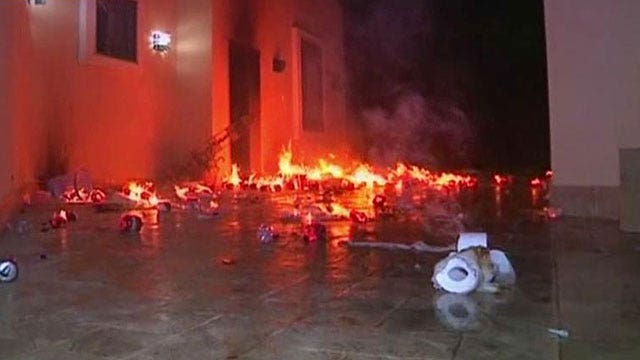Sean Smith's uncle: Benghazi emails raise more questions
Michael Ingmire wants answers from Valerie Jarrett
A top military intelligence official at the time of the Benghazi attacks testified Thursday that U.S. personnel "should have tried" to help Americans under fire on Sept. 11, 2012, in an unprecedented public statement from a leading military officer.
Retired Brig. Gen. Robert Lovell, who at the time of the attacks was the deputy intelligence director at U.S. Africa Command, questioned the merits of the ongoing debate over whether U.S. military forces could have responded in time. Leading Pentagon and other military officials previously have argued that additional U.S. assets were not deployed to assist Americans under attack that night because they weren't close enough.
"The point is we should have tried," Lovell told the House Oversight and Government Reform Committee, in his opening statement. "As another saying goes -- always move to the sound of the guns."
He later said the military "could have made a response of some sort." Lovell, who was stationed in Germany during the attack, made clear repeatedly that the military was waiting for clearance from the State Department to intervene in Benghazi.
Lovell also sharply countered claims that the intelligence community and military initially thought this was a protest over an anti-Islam video gone awry. He said U.S. officials knew this was a "hostile action" from the outset, even though they didn't know how long the attack would last.
"This was no demonstration gone terribly awry," Lovell said. "The facts led to the conclusion of a terrorist attack."
Under questioning, he also said the Internet video was "briefly discussed" on the ground but "dismissed" as a motive shortly afterward. He said officials soon concluded that Islamic militant group Ansar al-Sharia was involved.
The testimony is significant, as it marks the latest effort to lift the curtain behind what happened during the night of the attack and the ensuing days. In a cryptic statement, Lovell cited the need for a "full forthcoming to the American people."
"I felt it was my duty to come forward," he said. "The circumstances of what occurred there in Benghazi that day need to be known."
The testimony comes two days after new emails were obtained and released by a watchdog group showing a top White House aide was involved in preparing then-U.N. ambassador Susan Rice for her controversial Sunday show appearances, where she pushed the narrative that protests over an Internet video were to blame.
Rep. Darrell Issa, R-Calif., at the start of the hearing, ripped the administration over those emails, and accused it of deliberately hiding the documents after an earlier congressional subpoena.
"It is disturbing and perhaps criminal ... that documents like these were hidden by the Obama administration from Congress and the public alike," Issa said. He claimed the withholding of these documents is the worst transparency violation since at least the Nixon administration.
One email showed notes from White House adviser Ben Rhodes regarding a "prep call" with Rice; the notes discussed the Internet video as the cause. White House Press Secretary Jay Carney claimed Wednesday that the "prep call" was only in reference to demonstrations elsewhere in the Middle East and Africa, and not Benghazi.
Despite Lovell's testimony Thursday, other investigations and other officials have disputed the notion that the military could have done more. The House Armed Services Committee concluded in one report that the military response was lacking because of the positioning of U.S. forces at the time.
The report, though, did conclude that commanders did not do all they could to prepare for an extended operation.





